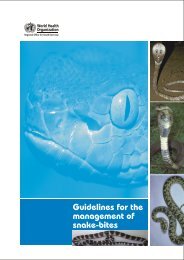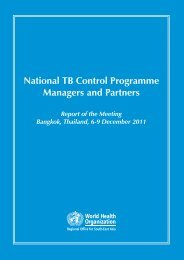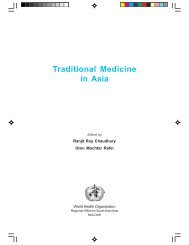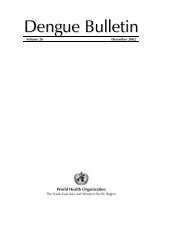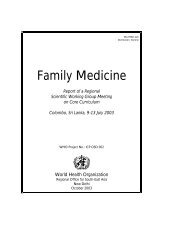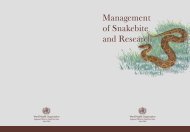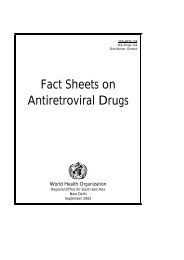South-East Asia Regional Conference on Epidemiology
South-East Asia Regional Conference on Epidemiology
South-East Asia Regional Conference on Epidemiology
You also want an ePaper? Increase the reach of your titles
YUMPU automatically turns print PDFs into web optimized ePapers that Google loves.
The way forward<br />
<str<strong>on</strong>g>South</str<strong>on</strong>g>-<str<strong>on</strong>g>East</str<strong>on</strong>g> <str<strong>on</strong>g>Asia</str<strong>on</strong>g> <str<strong>on</strong>g>Regi<strong>on</strong>al</str<strong>on</strong>g> <str<strong>on</strong>g>C<strong>on</strong>ference</str<strong>on</strong>g> <strong>on</strong> <strong>Epidemiology</strong> | 51<br />
Epidemiological research and practice can strengthen and inform efforts in the struggle against climate<br />
change. The ascertainment of baseline relati<strong>on</strong>s between climatic c<strong>on</strong>diti<strong>on</strong>s and health outcomes (12)<br />
can crucially support efforts towards strengthening health systems and improving preparedness and<br />
resp<strong>on</strong>se capacities. There is a need for appropriate methods to c<strong>on</strong>ceptualize the full chain of events<br />
leading to potential health effects.<br />
Most areas still need to build a solid base of retrospective studies assessing the relati<strong>on</strong>ship between<br />
past climate variability and selected infectious, diarrhoeal and vector-borne diseases. Retrospective<br />
evidence can provide the basis for c<strong>on</strong>ducting prospective studies that may give better c<strong>on</strong>trol over<br />
data collecti<strong>on</strong> and c<strong>on</strong>founders, thus enhancing ability to assess the differential effect of changes in<br />
climate over time. It is also necessary to increase the number of studies to establish appropriate risk<br />
thresholds for recurring events such as floods and heatwaves and to develop early warning systems.<br />
The identificati<strong>on</strong> of risk factors for climate-sensitive diseases is another key input to be derived<br />
from epidemiological research and practice so that vulnerable groups are identified and interventi<strong>on</strong>s<br />
targeted. These interventi<strong>on</strong>s can be m<strong>on</strong>itored and evaluated through result-based measurement of<br />
achieved reducti<strong>on</strong>s in incidence and/or mortality.<br />
Strategies and plans for adaptati<strong>on</strong> to climate change should systematically draw <strong>on</strong> epidemiological<br />
data to strengthen evidence base and overall validity. The supporting role of epidemiology in policy and<br />
decisi<strong>on</strong>-making regarding climate change must also extend to greenhouse gas emissi<strong>on</strong>s’ mitigati<strong>on</strong>.<br />
Health-risk and health-impact assessments must be included in the evaluati<strong>on</strong> of the effects and<br />
benefits of carb<strong>on</strong>-cutting interventi<strong>on</strong>s.<br />
In summary, the role of epidemiological research is critical for a better understanding of the health<br />
impacts of climate change. Such knowledge must be applied to strengthen health systems and to<br />
trigger adaptati<strong>on</strong> measures. It can also provide an evidence base of health benefits to support policies<br />
that can reduce greenhouse gas emissi<strong>on</strong>s.<br />
References<br />
(1) Climate Change 2007: Synthesis Report, IPCC, 2007. http://www.ipcc.ch/publicati<strong>on</strong>s_and_data/ar4/<br />
syr/en/mains1.html [Accessed <strong>on</strong> 29 April 2010].<br />
(2) Global health statistics. Geneva, World Health Organizati<strong>on</strong>, 2008.<br />
(3) Narain JP, Bhatia R. The challenge of communicable diseases in the WHO <str<strong>on</strong>g>South</str<strong>on</strong>g>-<str<strong>on</strong>g>East</str<strong>on</strong>g> <str<strong>on</strong>g>Asia</str<strong>on</strong>g> Regi<strong>on</strong>. Bull<br />
World Health Organ., 2010,88:162.<br />
(4) Kathmandu Declarati<strong>on</strong> <strong>on</strong> protecting health facilities from disasters. 27th Meeting of Ministers of<br />
Health. http://www.searo.who.int/LinkFiles/EHA_kathmandu-declarati<strong>on</strong>-09.pdf [Accessed <strong>on</strong> 28<br />
April 2010].<br />
(5) <str<strong>on</strong>g>Asia</str<strong>on</strong>g>n Development Bank. The ec<strong>on</strong>omics of climate change in <str<strong>on</strong>g>South</str<strong>on</strong>g>-<str<strong>on</strong>g>East</str<strong>on</strong>g> <str<strong>on</strong>g>Asia</str<strong>on</strong>g>: a regi<strong>on</strong>al review.<br />
Manila, ADB, 2009. Available from: http://www.adb.org.Documents/Books/Ec<strong>on</strong>omics-Climate-Chant3-<br />
SEA.default.asp [accessed 14 May 2009].<br />
(6) Kumaresan J, Sathiakumar N. Climate change and its potential impact <strong>on</strong> health: a call for integrated<br />
acti<strong>on</strong>. Bull World Health Organ., 2010, 88:163.<br />
(7) WHO. Malaria in the <str<strong>on</strong>g>South</str<strong>on</strong>g>-<str<strong>on</strong>g>East</str<strong>on</strong>g> <str<strong>on</strong>g>Asia</str<strong>on</strong>g> Regi<strong>on</strong> 2010 Overview. New Delhi, WHO <str<strong>on</strong>g>South</str<strong>on</strong>g>-<str<strong>on</strong>g>East</str<strong>on</strong>g> <str<strong>on</strong>g>Asia</str<strong>on</strong>g><br />
<str<strong>on</strong>g>Regi<strong>on</strong>al</str<strong>on</strong>g> Office, 2010.<br />
(8) Impact of climate change <strong>on</strong> communicable diseases. Geneva, World Health Organizati<strong>on</strong>, 2009. Available<br />
from: http://www.searo.who.int/EN/Secti<strong>on</strong>10/Secti<strong>on</strong>2537_14458.htm [accessed 28 May 2009].



